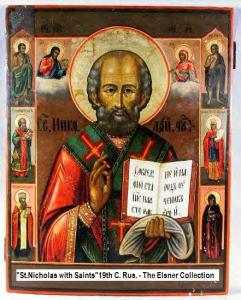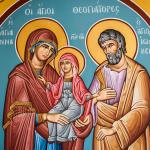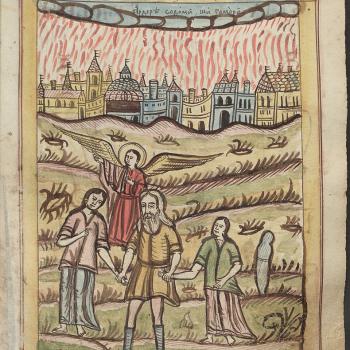
Saint Nicholas, beloved Archbishop of Myra, more than believed in the Christian faith, he lived it out in his life. The stories told about how he gave to those in need so that they would not have to sell themselves out to the world represent the kind of charity which Christ expects of his followers. Apocryphal stories which connect Nicholas to the Council of Nicea, suggesting that he punched Arius for his denial of the divinity of Christ, must be rejected because they do not properly present his moral character. While it is possible he was at Nicea (we do not know all who attended the council), it goes against his personality to think he would have violently attacked Arius. Nicholas was concerned about the faith, but his concern was about living it out, following the moral lessons of the Scriptures. Punching Arius would have been far from the mind of anyone who listened to and heeded the words of the Gospels. He probably was concerned about Arius and his teachings, but he is not known for works of theology; his own fame, his own saintliness, lay with his charity and the way he humbly helped those in need.
We should look to Nicholas’ holy example and imitate him, acting in reverence towards others, showing charity to those who are in need. In this way, we can be said to put on the “Armor of God.” For acting out the moral teachings of the faith, living them out, connects us to Christ, who then is able to help protect us against the temptations which come against us from our own sinful habits as well as the systematic structure of sin which we find around us:
Finally, be strong in the Lord and in the strength of his might. Put on the whole armor of God, that you may be able to stand against the wiles of the devil. For we are not contending against flesh and blood, but against the principalities, against the powers, against the world rulers of this present darkness, against the spiritual hosts of wickedness in the heavenly places. Therefore take the whole armor of God, that you may be able to withstand in the evil day, and having done all, to stand. Stand therefore, having girded your loins with truth, and having put on the breastplate of righteousness, and having shod your feet with the equipment of the gospel of peace; besides all these, taking the shield of faith, with which you can quench all the flaming darts of the evil one. And take the helmet of salvation, and the sword of the Spirit, which is the word of God (Eph. 6:10-17 RSV).
We are to stand against the powers that be – the structures of sin and the evil principles which lie behind them, not people themselves. When we find ourselves standing against those who promote and do evil, we should do so with care, remembering they, like everyone, was made in the image and likeness of God; as we do so, we will know that we are also fighting for them and their own good, struggling to free them from the bondage of evil which controls them and their lives, so that they can then find peace with God, which should be our goal.
We must stand for truth – not ideologies, not abstractions, but the real, concrete truth found in and revealed by the incarnation, the truth which connects heaven and earth and binds everything together with the bond of love. For truth brings peace if we understand both properly, but if we try to use truth as a weapon against others, as a tool for our own self-gain at the expense of everyone else, we do not truly hold to the truth but abuse it.
We are to hope for the salvation of all as we become Spirit-bearers, bringing grace to the world. By following the dictates of the Spirit, the Spirit of Life, the Spirit of Truth, we will find ourselves to be like Nicholas, helping those in need without looking for any reward for ourselves. As we do so, they will recognize something holy is found in our actions, a holiness which will attract them and lead them to look for and find the truth of God for themselves. This is what made Nicholas so great, why he went from being an obscure bishop in Myra to becoming one of the greatest, most famous saints of all – for he did not work out theological doctrines like a scholar, he did not seek mystical elevation for himself, but rather, he sought to continue to work in the world to make it a better place, even if it were for only a few people at a time.
If we read the Apocryphal story which indicated that Nicholas was willing to break the secular law and be thrown in jail by punching Arius allegorically instead of as literal history, it still has value as it can remind us that we, too, should not be overly concerned about unjust laws if they restrict us from following after the work of Christ. We must work to make the world a better place, even if those in positions of authority try to stop us; this, after all, is what Jesus did, as he was willing to heal on the Sabbath even if it meant breaking various rules and regulations many put in place in regards how they thought everyone should worship God:
Now he was teaching in one of the synagogues on the sabbath. And there was a woman who had had a spirit of infirmity for eighteen years; she was bent over and could not fully straighten herself. And when Jesus saw her, he called her and said to her, “Woman, you are freed from your infirmity.” And he laid his hands upon her, and immediately she was made straight, and she praised God.
But the ruler of the synagogue, indignant because Jesus had healed on the sabbath, said to the people, “There are six days on which work ought to be done; come on those days and be healed, and not on the sabbath day.” Then the Lord answered him, “You hypocrites! Does not each of you on the sabbath untie his ox or his ass from the manger, and lead it away to water it? And ought not this woman, a daughter of Abraham whom Satan bound for eighteen years, be loosed from this bond on the sabbath day?” As he said this, all his adversaries were put to shame; and all the people rejoiced at all the glorious things that were done by him (Lk. 13:10-17 RSV).
So many want to create rule after rule in regards worship; often, some rules are good for a particular time and place, and so long as they are helpful, they can be justified. But they must be understood as relative and not absolute, and other concerns, like the welfare of people around us, must also be a part of the consideration. Jesus showed us that if our rules end up hurting others, causing them undue harm, the rules are the problem and can be dispensed with as long as they foster such harm. Jesus shows us that our worship of God, and the rules and expectations we make concerning them, must never be pitted against the good of our neighbor and their rightful needs. If we are to keep the Sabbath holy, how can we do so, if the rules put in place put them in jeopardy? Jesus healed on the Sabbath, showing us that spiritual health is tied to bodily health and we should not pit the two against each other. Nicholas, of course, understood this, knowing that if he took care of those in need they would then be able to follow after God and live good and holy lives but if not, then they risked losing not only their bodies but their souls as well. This is one of the many lessons we should learn from the famous story associated with him helping the daughters of a merchant by secretly giving them money so they can get married instead of having to go into a life of prostitution.
If we care about the soul, we will care about the body. If we care about the body, then we will care about the health of our neighbor. We will not sacrifice them for our own desires. If we want to keep the Sabbath holy, if we care to worship God, we will do so with truth and love, love for God but also love for our neighbor, realizing we can’t properly love God if we disregard our neighbor and their needs. Nicholas shows us the example of a bishop, indeed, of a Christian who understood this. If we want to honor him and his memory, let us follow his example.
Stay in touch! Like A Little Bit of Nothing on Facebook.
If you liked what you read, please consider sharing it with your friends and family!












